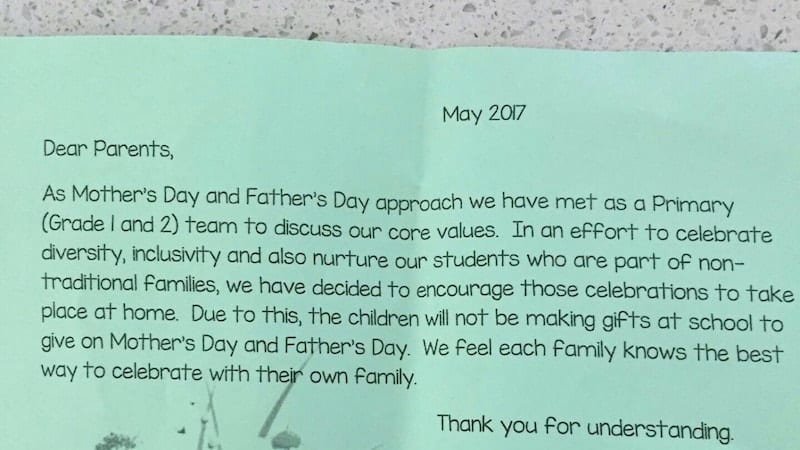Have you seen this yet? You probably have, but if not I’ll fill you in. An elementary school in British Columbia has become the center of the latest online kerfuffle for sending home a letter stating that they would no longer be creating Mother’s Day or Father’s Day crafts. They explained that celebrating the holidays at school did not support the school’s core values of “diversity, inclusivity, and [nurturing] our students who are part of non-traditional families.” The letter quickly went viral online with the headline “Canceling Mother’s Day” and people who support the decision clashing with those angered by it.
I’ve decided to jump into the fray. Despite admiring its values, I think the school made the wrong choice. I’d like to share my three reasons why and hear your argument for or against celebrating Mother’s and Father’s Day in schools in the comments.
Crafting with intention
One of the most common arguments in support of the school canceling Father’s and Mother’s Day crafts has been, “Good! Students shouldn’t spend school time on holiday crafts. These kids should be learning how to read and write!” I understand people outside of education feeling this way, but was surprised by the number of teachers with that opinion. Crafts are popular in elementary school not because all teachers are naturally obsessed with glitter and the millions of creative uses for paper plates. They’re popular because they do teach useful skills. Following directions, hand-eye coordination, manual dexterity, written expression, and exploring creativity are just a few of the important skills children learn through crafts. At the primary level, these are precisely the skills students need to be practicing.
Teachers don’t just teach subjects, we teach values
As any teacher knows, we don’t just teach reading, math, and writing in elementary school. We teach that it is important to show respect and to appreciate others. We teach gratitude and why it is important to thank those that help us. These skills are integral to helping children mature and become responsible adults. When we spend time talking about the people in our lives who love us, we’re teaching kids to be the type of grownups we strive to be.
Inclusiveness and diversity aren’t taught by exclusion
Every teacher and district leader wants all their students to feel nurtured and welcomed, but barring a celebration is not the way to do it. Family is something to celebrate and all students should be encouraged to celebrate those who love and raise them—no matter what their family looks like. The conversation should be about creating opportunities to celebrate diverse families, rather than eliminating the celebrations altogether.
It’s also true that some students may feel sadness because of the loss of a parent, the lack of a parent, or another reason. But our students aren’t entering a world that will protect them from every uncomfortable experience. Our job isn’t to shield them, but rather help them learn to deal with their feelings healthily. If we’re students of our students, then we know when an activity or lesson might be challenging. We can let them know in advance what is going to happen, privately ask them how they would like to handle it, and help determine a more positive path forward.
A different approach
Instead of canceling Mother’s Day and Father’s Day celebrations, why not expand on them? Use them to teach our students to be grateful for those who raise, guide, love, and look after them. It doesn’t matter if that person is called mother, father, grandparent, aunt, uncle, teacher, social worker, or someone else. Students can participate by thanking the person who, in their lives, matches the true spirit of Mother’s or Father’s Day. No one is excluded and everyone gets to participate in a day of gratitude and love.
What do you think? Should schools celebrate Mother’s Day and Father’s Day? Or let students keep the celebrations at home?
